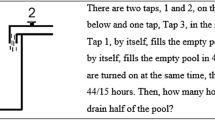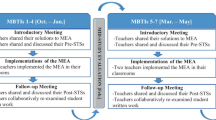Abstract
One important goal of teacher education has been to improve pre-service teachers’ understanding of the connection between real-life events and mathematics. Toward this goal, we designed two mathematics teacher education courses based on the Models-and-Modeling Perspective. This study presents a three-tier modeling investigation of (a) pre-service teachers’ views about characteristics of realistic mathematics problems, and (b) teacher-level skills required to write such problems. A team of researchers analyzed 15 pre-service mathematics teachers’ written artifacts and audio recordings of their discussion by employing the data analysis methods of constructivist grounded theory. In these two modeling-based courses, pre-service teachers completed several modeling cycles, during which they exhibited significant changes in their understandings about the characteristics of realistic problems and the skills that are needed to write–revise–refine such problems. The results thus indicated that modeling-based courses helped pre-service teachers think critically about stereotypical textbook problems, view realistic contexts as a medium through which mathematical ideas could be reasoned, understand the mathematical residuals of lessons involving realistic problems, and attain the skills needed to write and revise such problems. Hence, the modeling perspective provided an effective approach for pre-service mathematics teacher training, ensuring pre-service teachers’ development as they express–test–revise–refine their thinking, understandings, and skills.



Similar content being viewed by others
References
Bonotto, C. (2007). How to replace word problems with activities of realistic mathematical modelling. In W. Blum, P. Galbraith, M. Niss & H.-W. Henn (Eds.), Modelling and applications in mathematics education. The 14th ICMI study (New ICMI; Studies Series) (Vol. 10) (pp. 185–192). New York: Springer.
Borromeo Ferri, R. (2006). Theoretical and empirical differentiations of phases in the modelling process. ZDM, 38(2), 86–95.
Chapman, O. (2006). Classroom practices for context of mathematics word problems. Educational Studies in Mathematics, 62, 211–230.
Charmaz, K. (2006). Constructing grounded theory: A practical guide through qualitative analysis. London: Sage.
Clark, K. K., & Lesh, R. (2003). A modeling approach to describe teacher knowledge. In R. Lesh & H. Doerr (Eds.), Beyond constructivism: A models and modelling perspective on mathematics problem solving; learning and teaching (pp. 159–173). Mahwah: Lawrence Erlbaum.
de Lange, J. (1996). Using and applying mathematics in education. In A. J. Bishop, K. Clements, C. Keitel, J. Kilpatrick & C. Laborde (Eds.), International handbook of mathematics education (part 1, pp. 49–97). Dordrecht: Kluwer Academic.
Depaepe, F., De Corte, E., & Verschaffel, L. (2010). Teachers’ approaches towards word problem solving: Elaborating or restricting the problem context. Teaching and Teacher Education, 26, 152–160.
Dienes, Z. (1960). Building up mathematics (4th edn.). London: Hutchinson Educational.
Dienes, Z. (1967). The power of mathematics. London: Hutchinson Educational.
Doerr, H. M. (2006). Teachers’ ways of listening and responding to students’ emerging mathematical models. ZDM, 38(3), 255–268.
English, L. D. (2006). Mathematical modeling in the primary school: Children’s construction of a consumer guide. Educational Studies in Mathematics, 63(3), 303–323.
English, L. D. (2009). Promoting interdisciplinarity through mathematical modelling. ZDM The International Journal on Mathematics Education, 41(1–2), 161–181.
English, L. D., & Mousoulides, N. G. (2015). Bridging STEM in a real-world problem. Mathematics Teaching in the Middle School, 20(9), 532–539.
Even, R., & Tirosh, D. (1995). Subject-matter knowledge and knowledge about students as sources of teacher presentations of the subject-matter. Educational Studies in Mathematics, 29(1), 1–20.
Gravemeijer, K. (2007). Emergent modelling as a precursor to mathematical modelling. In W. Blum, P. L. Galbraith, H.-W. Henn & M. Niss (Eds.), Modelling and applications in mathematics education: The 14th ICMI study (new ICMI study series, Vol. 10) (pp. 137–144). New York: Springer.
Gravemeijer, K., & Doorman, M. (1999). Context problems in realistic mathematics education: A calculus course as an example. Educational Studies in Mathematics, 39(1–3), 111–129.
Greer, B., Verschaffel, L., & Mukhopadhyay, S. (2007). Modelling for life: Mathematics and children’s experience. In W. Blum, P. L. Galbraith, H.-W. Henn & M. Niss (Eds.), Modelling and applications in mathematics education: The 14th ICMI study (pp. 89–98). New York: Springer.
Hamilton, E., Lesh, R., Lester, F., & Brilleslyper, M. (2008). Model-eliciting activities (MEAs) as a bridge between engineering education research and mathematics education research. Advances in Engineering Education, 1(2), 1–25.
Hjalmarson, M., & Lesh, R. (2008). Engineering and design research: Intersections for education research and design. In A. Kelly, R. Lesh & K. Baek (Eds.), Handbook of design research methods in education: Innovations in science, technology, engineering, and mathematics learning and teaching (pp. 96–110). New York: Routledge.
Kaiser, G., & Sriraman, B. (2006). A global survey of international perspectives on modeling in mathematics education. ZDM, 38(3), 302–310.
Lesh, R. (2006). New directions for research on mathematical problem solving. In P. Grootenboer, R. Zevenbergen, & M. Chinnappan (Eds.), Identities, cultures and learning spaces. Proceedings of the 29th annual conference of the mathematics education research group of Australasia, Canberra (Vol. 1, pp. 15–34). Adelaide: MERGA.
Lesh, R., & Doerr, H. M. (2003). Foundations of a models and modeling perspective on mathematics teaching, learning, and problem solving. In R. Lesh & H. M. Doerr (Eds.), Beyond constructivism: Models and modeling perspectives on mathematics problem solving learning, and teaching (pp. 3–34). Mahwah: Lawrence Erlbaum.
Lesh, R., English, L., Riggs, C., & Sevis, S. (January, 2013). Problem solving in the primary school (K-2). [Special issue]. The mathematics enthusiast, special issue: International perspectives on problem solving research in mathematics education, 10 (1, 2), 35–60.
Lesh, R., & Harel, G. (2003). Problem solving, modeling, and local conceptual development. Mathematical Thinking and Learning, 5(2–3), 157–189.
Lesh, R., Hoover, M., Hole, B., Kelly, A., & Post, T. (2000). Principles for developing thought-revealing activities for students and teachers. In A. Kelly & R. Lesh (Eds.), Handbook of research design in mathematics and science education (pp. 113–149). Mahwah: Lawrence Erlbaum.
Lesh, R., & Lehrer, R. (2000). Iterative refinement cycles for videotape analyses of conceptual change. In A. E. Kelly & R. A. Lesh (Eds.), Handbook of research design in mathematics and science education (pp. 665–708). Mahwah: Lawrence Erlbaum.
Lesh, R., & Lehrer, R. (2003). Models and modeling perspectives on the development of students and teachers. Mathematical Thinking and Learning, 5(2–3), 109–129.
Lesh, R., Sriraman, B., & English, L. (2014). Theories of learning mathematics. In S. Lerman (Ed.), Encyclopedia of mathematics education (pp. 615–623). Netherlands: Springer.
Lesh, R., & Yoon, C. (2004). Evolving communities of mind-in which development involves several interacting and simultaneously developing strands. Mathematical Thinking and Learning, 6(2), 205–226.
Lewis, C. C. (2000). Lesson study: The core of Japanese professional development. Invited presentation to the Special Interest Group on Research in Mathematics Education at the annual meeting of the American Educational Research Association, New Orleans.
MAXQDA, software for qualitative data analysis (1989–2015) VERBI software—consult. Sozialforschung GmbH, Berlin.
Mousoulides, N. G. (2013). Facilitating parental engagement in school mathematics and science through inquiry-based learning: An examination of teachers’ and parents’ beliefs. ZDM, 45(6), 863–874.
Näveri, L., Pehkonen, E., Hannula, M. S., Laine, A., & Heinilä, L. (2011). Finnish elementary teachers’ espoused beliefs on mathematical problem solving. In Current state of research on mathematical beliefs XVII. Proceedings of the MAVI-17 conference (pp. 161–171).
Peled, I., & Balacheff, N. (2011). Beyond realistic considerations: Modeling conceptions and controls in task examples with simple word problems. ZDM, 43(2), 307–315.
Schorr, R., & Lesh, R. (2003). A modeling approach for providing teacher development. In R. A. Lesh & H. M. Doerr (Eds.), Beyond constructivism: Models and modeling perspectives on mathematics problem solving; learning; and teaching (pp. 141–158). Mahwah: Lawrence Erlbaum.
Sevis, S. (2016). Unpacking teacher knowledge for bridging in- and out-of-school mathematics using mathematically-rich and contextually-realistic problems. ProQuest Digital Dissertations (UMI No: 10143631).
Sriraman, B., & Lesh, R. (2006). Modeling conceptions revisited. ZDM, 38(3), 247–254.
TIMSS Video Study. (1999). Japan public release lesson 2 lesson graph [8th grade]. http://www.timssvideo.com/sites/default/files/JP2%20Lesson%20Graph_0.pdf.
University Catalog (2005). General catalog 2005–2007. Ankara: METU Printing Studio Press.
Verschaffel, L., de Corte, E., & Borghart, I. (1997). Pre-service teachers’ conceptions and beliefs about the role of real-world knowledge in mathematical modelling of school word problems. Learning and Instruction, 7(4), 339–359.
Verschaffel, L., Greer, B., & De Corte, E. (1999). Pupils’ beliefs about the role of real-world knowledge in mathematical modelling of school arithmetic word problems. In E. Pehkonen & G. Tomer (Eds.), Oberwolfach meeting on belief research (pp. 138–168).
Wubbels, T., Korthagen, F., & Broekman, H. (1997). Preparing teachers for realistic mathematics education. Educational Studies in Mathematics, 32(1), 1–28.
Author information
Authors and Affiliations
Corresponding author
Additional information
Richard Lesh—Emeritus Professor.
Electronic supplementary material
Below is the link to the electronic supplementary material.
Rights and permissions
About this article
Cite this article
Sevinc, S., Lesh, R. Training mathematics teachers for realistic math problems: a case of modeling-based teacher education courses. ZDM Mathematics Education 50, 301–314 (2018). https://doi.org/10.1007/s11858-017-0898-9
Accepted:
Published:
Issue Date:
DOI: https://doi.org/10.1007/s11858-017-0898-9




